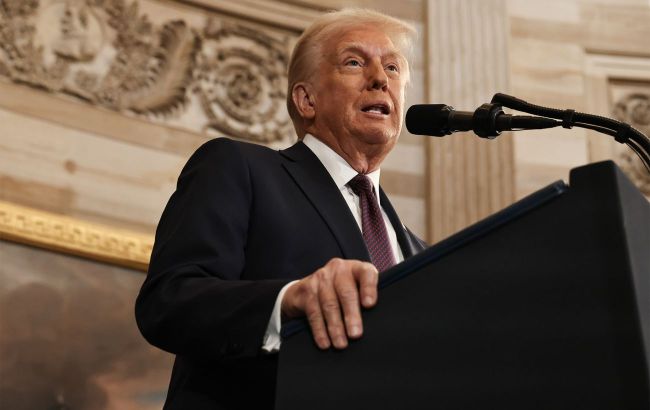No fight needed: Trump’s 100% tariff threat to BRICS and future of dollar
 Trump threatens to impose 100% tariffs on goods from BRICS countries (Photo: GettyImages)
Trump threatens to impose 100% tariffs on goods from BRICS countries (Photo: GettyImages)
US President Donald Trump has promised to impose 100% tariffs on goods from BRICS countries, including Russia, if they refuse to use the US dollar.
Read RBC-Ukraine’s analysis on how serious these threats are and what will happen to the economies of these countries if Trump dares to take this step.
Contents
Why has Trump started threatening high tariffs
On Thursday, January 30, US President Donald Trump once again threatened to impose 100% tariffs on BRICS countries if they attempt to replace the U.S. dollar as the reserve currency. This happened on the eve of his decision to introduce 25% tariffs on goods from Canada and Mexico.
"The idea that the BRICS Countries are trying to move away from the Dollar while we stand by and watch is OVER. We are going to require a commitment from these seemingly hostile Countries that they will neither create a new BRICS Currency, nor back any other Currency to replace the mighty U.S. Dollar or, they will face 100% Tariffs and should expect to say goodbye to selling into the wonderful US Economy," Trump wrote on his social network Truth Social and repeated the statement the next day on X.
BRICS countries first officially discussed abandoning the US dollar in 2014. At the BRICS summit in Fortaleza, Brazil, the creation of the New Development Bank (NDB) was announced as an alternative to the World Bank and the International Monetary Fund.
This decision was made amid growing political tensions, mainly after sanctions were imposed on Russia following the annexation of Crimea in 2014. This situation pushed BRICS countries to seek mechanisms to reduce their dependence on the US dollar and Western financial institutions.
The most recent statements about the intention to abandon the US dollar and create their own currency were made at the BRICS summit in Kazan, Russia, in late October 2024. In response, Trump published an almost identical statement in November: "The idea that the BRICS Countries are trying to move away from the Dollar while we stand by and watch is OVER."
Is it realistic for BRICS countries to abandon the dollar
Trump may have won without a fight, as BRICS countries will not create their currency, according to Serhiy Fursa, Deputy Director for Securities Trading at the investment company Dragon Capital.
"The BRICS countries themselves abandoned this idea because it is fundamentally unfeasible. Trump has a separate history with China dates back to his first presidential term when the trade war began, tariffs were raised, and now it is being discussed again. Could such steps on his part harm the US economy as well? Absolutely, they will. In any case, introducing tariffs leads to accelerated inflation, which is destructive for any economy, including the American one," Fursa noted.
Financial analyst Andriy Shevchyshyn also believes that it is impractical for BRICS countries to create their own currency. The strength of this bloc currently lies in one key player — China. Therefore, according to Shevchyshyn, a more reasonable approach would be to expand the use of the Chinese yuan in transactions between BRICS countries instead of creating a new currency.
"The yuan has a significant drawback—its exchange rate is effectively controlled by the central bank, which keeps it fixed. They can change the exchange rate at any moment, which does not raise many questions. Of course, many countries use the yuan, and China is actively promoting its projects in Latin America, the Middle East, Africa, and Asia, encouraging them to work with this currency. The yuan is the world's third most widely used currency after the dollar and the euro, although its share is gradually decreasing," Shevchyshyn explained in a comment to RBC-Ukraine.
He added that even if Trump decided to impose 100% tariffs, it is unclear how the tariff burden would be distributed among BRICS countries. If calculated based on GDP levels, China would suffer the most.
"China can implement its policy through its national yuan rather than another currency. Therefore, in my opinion, we are unlikely to see a BRICS currency. If it does not happen, then it is likely just a strategic move allowing BRICS countries to continue discussions and negotiations, particularly with China," Shevchyshyn remarked.
India's parliament member Shashi Tharoor has already stated that "there are no plans to introduce an alternative to the US dollar." Additionally, Kremlin spokesman Dmitry Peskov said that BRICS countries are only discussing the creation of joint investment platforms.
Importance of the dollar in the global economy
After World War II, the dollar replaced the British pound as the world's reserve currency, and today, it accounts for more than half of global currency reserves. This has made the dollar a symbol of the financial and political dominance of the United States worldwide.
"Abandoning the dollar is extremely dangerous for the US because the Bretton Woods agreement effectively shifted the world to a dollar-based system. Debts, financial ties, and many other aspects are tied to the dollar. Most countries keep their reserves in dollar assets because the US financial market is the largest in the world and offers numerous investment opportunities," said financial analyst Andriy Shevchyshyn.
He specified that if the dollar lost its position, it would jeopardize the ability of the US to manage its debt burden. Last year alone, the cost of servicing US debt amounted to $1 trillion.
"This is a large sum, and managing it would become difficult if the US lost control over the dollar. They attract funds through new loans, but what happens if the dollar weakens? That’s why Trump insists on lowering the Federal Reserve’s interest rate, which could stimulate the economy and lending but would also reduce the value of debts," Shevchyshyn added.
According to the Federal Reserve, from 1999 to 2019, the dollar accounted for 96% of international trade transactions in the Americas, 74% in Asia, and 79% in other parts of the world. Globally, banks used the dollar for about 60% of their deposits and loans. In the currency market, the dollar is involved in nearly 90% of all transactions today.
Thailand has accepted Russia’s invitation to become a BRICS partner. The invitation was extended last fall when Russia held the BRICS chairmanship, and by the end of the year, Thailand was reviewing the offer.
Sources: comments for RBC-Ukraine from Dragon Capital Deputy Director for Securities Trading Serhiy Fursa and financial analyst Andriy Shevchyshyn, and information from Truth Social, Reuters, The Times of India, US News & World Report, and CNN.

